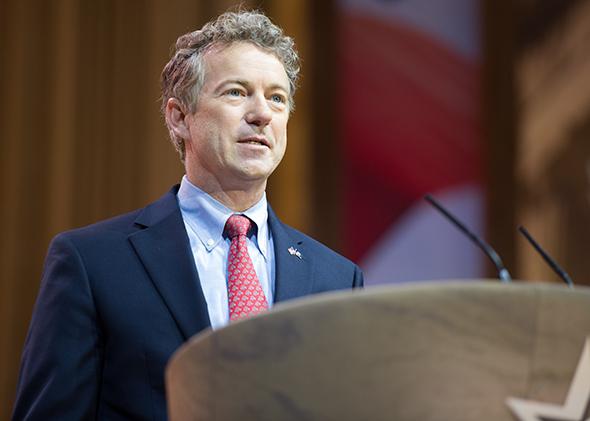If you want a sense of how much black voters dislike the GOP, consider this: Both Mitt Romney and John McCain scored single digits with blacks, 6 percent and 4 percent, respectively. The last time this happened, it was 1964 and the Republican presidential nominee—Arizona Sen. Barry Goldwater—had pledged his opposition to the bulk of the Civil Rights Act, driving blacks out of the party just four years after they gave Richard Nixon a sizable minority in his presidential bid.
Put another way, the last time Republicans were this unpopular with black Americans, their nominee had sided with white supremacists. Which is to say, the party has a serious image problem, to say nothing of an electoral one.
If blacks were dispersed throughout the country, or concentrated in a handful of red and blue states—like Latinos and Asians—the GOP’s disadvantage wouldn’t mean much. But most blacks live in the South and the areas around it, which includes a large number who live in swing states—like Florida, North Carolina, Virginia, and Ohio—as well as potential swing states like Michigan, Pennsylvania, and Indiana. What’s more, the huge Democratic advantage means that any black voter at the polls is a Democratic voter. In those states, as long as there’s average or high turnout, black voters have an outsized effect on the popular vote. In 2012, for instance, Obama won several states by substituting new black voters for lost white ones. What’s more, his popular vote margin in Ohio can be explained solely by higher black turnout.
Imagine a world where Mitt Romney won the votes of 9 or 10 percent of black Americans, in line with the GOP’s historic performance with blacks since 1964. In that world, given the geography of the black vote, there’s a good chance Romney is president, having deprived Obama of needed votes in Ohio, Virginia, and Florida.
For the GOP, then, African-American outreach is critical, and according to BuzzFeed’s McKay Coppins, the Republican National Committee has developed a strategy for competing for the black vote: meeting with local black leaders, recruiting black politicians, and attacking black voices in media.
If your reaction to the last item is a raised eyebrow, you’re not alone. To rational ears, that sounds counterproductive. But the RNC believes it can work. To wit, after a dismissive tweet from Jamilah Lemieux, senior editor for Ebony, to Raffi Williams, a staffer with the RNC, Republicans escalated the online conflict, and Chairman Reince Priebus demanded an apology. Here’s BuzzFeed with more:
RNC Communications Director Sean Spicer later said their decision to escalate the flap with Ebony was meant to show black voters that Republicans took their votes seriously. “This was not meant to be provocative,” Spicer told BuzzFeed. “What this was really about was letting the readers of a very prominent African-American magazine know the Republican Party is fighting for their vote.”
In reality, BuzzFeed notes, this rallied readers to Ebony, with a vocal hashtag—#StandWithJamilah—and thousands of tweets. Which makes sense. You don’t appeal to voters with antagonism. Otherwise, 2012 would have ended in a landslide of Latino support for Mitt Romney, driven by vocal calls for “self-deportation” and draconian laws against immigration. Indeed, if there’s anyone who responds well to attacks on black media figures—which includes a well-publicized scuffle between the RNC and Melissa Harris-Perry of MSNBC—it’s the most resentful Republican voters, who listen to Limbaugh and cheer attacks on “race baiters.”
If the RNC wanted to do actual outreach to black voters, it would look for common ground on issues of mutual concern. As it stands, just a handful of Republicans have moved in that direction. The most prominent is Kentucky Sen. Rand Paul, who—as BuzzFeed points out—“has been an outspoken advocate for softening drug laws, reforming the criminal justice system, and creating major tax breaks for areas in financial distress, like Detroit.” In addition, he’s pushed “school choice” for low-income students and made direct appeals to black audiences, still a rarity for Republican politicians.
Of course, not all Republicans share Paul’s libertarian approach to criminal justice. Even still, there are avenues for economic outreach that Republicans could take. One of the largest obstacles to black mobility—across class lines—is residential segregation. Overwhelmingly, black Americans live in neighborhoods with higher poverty rates than whites, with worse schools, fewer jobs, and more crime. For middle-class black Americans, this is a barrier to economic security; for their poor and working-class neighbors, it’s a wall to opportunity.
One approach for Republicans is to merge relocation assistance and direct income support—ideas endorsed by conservative thinkers and Republican politicians—with an aggressive commitment to anti-discrimination enforcement in housing, and deregulation of residential land use.
In other words, the GOP could commit to residential integration as a matter of policy. As sociologist Mary Pattillo writes in her book Black Picket Fences: Privilege and Peril Among the Black Middle Class, “[M]ore strict desegregation laws would also open the door for low-income blacks to move to predominantly white neighborhoods, where jobs and resources are unfairly clustered.” Moreover, this agenda of cheaper housing, anti-discrimination, and relocation assistance would help break the concentrated poverty of segregated neighborhoods, and reduce the odds of downward mobility for middle-class blacks.
None of this is at odds with GOP preferences. If anything, it can be coupled with other agenda items—like vouchers and charter schools—to form a robust appeal to black (and Latino) voters. And if it came with significant criminal justice reform, it would stand as a compelling alternative to Democratic policies.
Obviously, there’s room to tinker and disagree. The point is that, when it comes to black Americans and the GOP, we’re past the time for meetings, speeches, and worthless media stunts. Either Republicans offer concrete policies—and abandon the drive for voter suppression—or they give up on the black vote and hand Democrats a nice, permanent boost in national elections.
